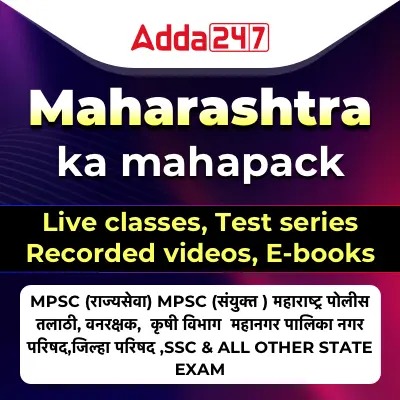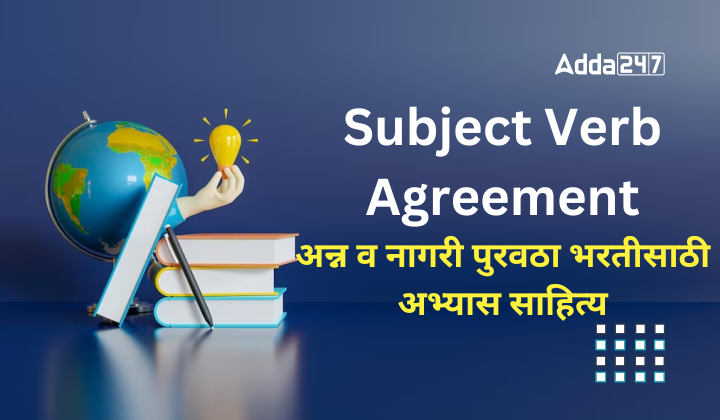Table of Contents
Subject Verb Agreement
Subject Verb Agreement: महाराष्ट्रातील तसेच राज्यातील बहुतेक स्पर्धा परीक्षेचा महत्वाचा विषय म्हणजे इंग्लिश. इंग्लिश विषयात जास्तकरून इंग्लिश ग्रामर वर प्रश्न विचारले जातात. नेहमीच्या सरावाने इंग्लिश विषयात चांगले गुण मिळू शकतात. आगामी काळातील सरळसेवा भरती जसे की, अन्न व नागरी पुरवठा विभाग भरती आणि इतर स्पर्धा परीक्षांमध्ये इंग्लिश ग्रामरला विशेष महत्त्व आहे. इंग्लिश ग्रामर चे रोज वाचन फायदेशीर ठरते. इंग्लिश ग्रामर मधील एक महत्वपूर्ण घटक म्हणजे Subject Verb Agreement. यावर परीक्षेत हमखास 1 ते 2 प्रश्न विचारले जाऊ शकतात. या लेखात आपण Subject Verb Agreement व त्यातील महत्वाचे नियम यावर माहिती पाहणार आहोत.
Subject Verb Agreement: विहंगावलोकन
इंग्रजी व्याकरणाचा अभ्यास करतांना Subject Verb Agreement या घटकाचा अभ्यास करणे महत्वाचे ठरते. या लेखात Subject Verb Agreementबद्दल सविस्तर माहिती दिली आहे.
| Subject Verb Agreement: विहंगावलोकन | |
| श्रेणी | अभ्यास साहित्य |
| उपयोगिता | अन्न व नागरी पुरवठा आणि इतर सर्व स्पर्धा परीक्षांसाठी उपयुक्त |
| विषय | इंग्रजी व्याकरण |
| लेखाचे नाव | Subject Verb Agreement |
| लेखातील प्रमुख मुद्दे |
|
Subject Verb Agreement
In English, the basic structure of a sentence is as follows:
‘Subject + Verb + Object’
Now, for a sentence to be grammatically correct, the verb must agree with the subject. In the other words, the verb used must be in accordance with the person and number of subject.
For example, look at the following sentence
(a) Shivam writes a letter (Singular verb is used with singular Subject)
(b) They write a letter (Plural verb used with Plural subject)
Rules of Subject Verb Agreement
In order to attain grammatical accuracy some rules must be followed which are as follows
Rule 1: If two subjects are joined by ‘and’ and they denote two separate entities or ideas, plural verb will be used.
For Ex- (a) Ravi and Rakesh are playing.
(b) You and Amit are late today.
Rule 2: If two (or more) nouns or adjectives are joined by ‘and’ but they denote a single person/thing idea, singular verb is used.
For Ex- (a) This black and white tie is mine.
(b) Bread and butter, is my favourite breakfast.
(c) Slow and steady, wins the race
Rule 3: If the subjects are joined by expressions like “alongwith, with, as well as, In addition to, besides, nothing, unlike, like, no less than, etc” the verb that follows agrees with the first subject.
For Ex- a) Rohan as well as his friends is playing.
(b) They along with their teacher are going on vacations.
Rule 4: If two subjects are joined by “either… or, neither. …….nor, nor, or, not only…………..but also” the verb agrees with the subject nearest to it.
For Ex- (a) Neither Ram nor Rohan is coming today.
(b) Not only Shyam but also his parents were present in the wedding.
Rule 5: “Neither of, cither of, none of” etc. are followed I by plural noun and singular verb.
For Ex-(a) Neither of these two girls is clever.
(b) Either of you was absent from the class.
Rule 6: Sometimes words like “Somebody, Everybody, each, nobody anybody, everyone, everybody, nothing, every, anything” are used as subjects. In such case singular verb agrees with them.
For Ex- (a) Nobody knows about the future.
(b) Nothing is impossible if you have determination.
(c) Each boy is good in Maths.
Rule 7: If following expressions are followed by uncountable noun. We use singular verb with them. “Most of, Half of, some of, enough of, plenty of, a lot of”
For Ex-(a) Some milk is needed.
(b) Most of the work has been done.
Rule 8: Similarly, if following expressions are followed by countable noun we use plural verb with them. “Most of/Half of, some of, enough of, plenty of, a lot of”
For Ex-(a) Some questions are difficult.
(b) Most of the boys were absent.
Rule 9: “More than one” is followed by singular countable noun and singular verb.
For Ex- (a) More than one boy was absent.
(b) More than one man was against the proposal.
But, “More than two/three/four” is followed by plural noun and plural verb.
For Ex- (a) More than two boys were absent.
(b) More than ten houses were damaged in the flood.
Rule 10: Following expression are followed by plural noun and plural verb.”A large number of, A number of” number of, A great number of large
For Ex-(a) A large number of cows are grazing in the field.
(b) A number of boys are playing cricket.
But, ‘the number of’ is always followed by singular verb
For Ex-(a) The number of children is twenty.
(b) The number of passenger in Metro is increasing.
Rule 11: We use plural subject and Plural verb with the following: “Many, A great many, A good many, Many of, A great many of, A good many of, both, several, various, Both of, Several of, various of, few, a few, very few, few of, a few of, very few of”
For Ex-(a) Many boy are absent today.
(b) A great many actors are coming.
(c) Many of the girls are taking part in the contest.
(d) Very few students are hard working.
But, ‘many a’ is followed by singular noun and singular verb.
For Ex- (a) Many a boy has come for the class.
(b) Many a car has been stolen.
Rule 12: If we use ‘the’ before any adjective, then ‘Plural verb’ is used ie. The weak, The rich, The poor, The honest, The injured, The dumb, The French, etc. are all used as plural subject.
For Ex-(a) The poor are generally hardworking.
(b) The rich are not always happy.
Rule 13: If ‘Nothing but/Everything but’ is followed by uncountable noun or countable noun, singular verb is used.
For Ex-(a) Nothing but milk is sold.
Rule 14: ‘One of the’ is always followed by Plural noun and is agreed with singular verb.
For Ex- (a) One of the boys was playing chess
(b) One of the girls is crying.
Rule 15: If there is any definite unit/distance/height, etc. followed by the construction: Numeral + Plural Noun, then the verb is always singular.
For Ex- (a) Ten thousand rupees is a good amount.
(b) Twenty tons of rice is enough for us.
But, if it refers to different units in the construction of Numerical Adjective + Plural Noun, then it takes a Plural verb.
For Ex- Twelve hundred rupees have been spent on shopping.
Rule 16: If who/which/ that is 2 used as a relative pronoun, then the verb that follows depends on the antecedent.
For Ex-(a) I, who am a cricketer, play here.
↓
Relative Pronoun
Rule 17: With expression like if/as if/ as though/ I wish etc only ‘were’ form of ‘to be’ is used.
For Ex- (a) I wish, I were the President of India.
(b) If I were you, I would have finished the work.
Rule 18: If an article is placed before two nouns, it means the person/ thing is the same for which two nouns are used.
For Ex- Mr. Sharma, The chairman and Managing Director of the company, has arrived. Here single article (the) is placed before chairman and Managing Director.
It means that Mr. Sharma is both the chairman and M.D. of the company But if an article is used before every noun. Then the nouns refer to different persons.
For Ex- The director and the producer have come.
Rule 19: ‘All’ can be used in both ‘countable’ and ‘uncountable’. When used as uncountable, we use singular verb and when used as countable, it takes plural verb.
For Ex- (a) All is good now a days.
(b) Here all is uncountable, Hence verb is singular.
(c) All have gone to Mumbai.
Here all is countable, hence verb is plural
Rule 20: Whenever ‘Amount of/ Quantity of’ is followed by an uncountable noun, singular verb follows
For Ex- The amount of milk is sufficient.
Rule 21: Some nouns exist only in plural form. Such nouns are: Scissors, tongs, pliers, trousers, Pants, Pajamas, Shorts, Sunglasses, gallows, riches, savings, congratulations, regards, alms, wages, belongings, troops, tactics, etc.
The verb that follows the nouns given above is always plural.
For Ex- (a) Where are my pants?
(b) His new sunglasses are quite expensive.
Rule 22: Some nouns like Scenery, Poetry, Furniture, Hair, Business, Mischief, Information, Luggage, Work, Traffic, Stationery, Equipment, Evidence, Electricity, Behaviour, crockery, etc. are uncountable. Hence, Singular verb is used with them.
For Ex- (a) The scenery of Switzerland mesmerises everyone.
(b) The furniture that I bought yesterday is really comfortable.
Rule 23: Some nouns like Economics, ethics, mathematics, rickets, etc. are plural in form but Singular in meaning. Hence, they take Singular verb.
For Ex- (a) Economics is an easy Subject.
(b) Politics is a dirty game.
Since the above statement describes politics in a general form. Therefore the verb (is) that follows is also singular. Now, look at the following sentence:
Politics of our Country are dirty. Here, ‘Politics’ has been particularised. Hence, plural verb has been used.
Rule 24: Similarly, there are some nouns, like Cattle, cavalry, infantry, children, gentry etc. that are singular in form but plural in meaning. Hence they take plural verb.
For Ex- Cattle are grazing in the field.
Rule 25: Collective nouns always take ‘singular verb’.
For Ex- (a) The pride of lions is hunting.
(b) This bundle of sticks is heavy.
Subject Verb Agreement: नमुना प्रश्न
Direction: Find out the error in each of the following sentences, if there is no error, answer is (e). Avoid punctuation mistakes (if any).
1. (a) Neither of them/ (b) are going/(c) to take/(d) the exam on 4th March. / (e) No error.
2. (a) She walked ten miles / (b) which are really a great distance/(c) for a woman like her /(d) who is not only old but also injured. /(e)No error.
3. (a) Either my father/(b) or my mother /(c) are going /(d) to attend my cousin’s wedding. /(e) No error.
4. (a) The rise and fall/ (b) of the share prices/(c) are due to /(d) policy paralyses on management’s part. /(e) No error.
5. (a) Many a /(b)men have/(c) succumbed to/ (d) this temptation. / (e) No error.
6. (a) The invention of AC, T.V/(b)and such other appliances/(c) have not been without /(d) some effect./ (e) No error.
7. (a) Each of the students/ (b) in the science class has/(c) to prepare their/(d) own research paper this semester. /(e) No error.
8. (a) Everyone of the novels/ (b)you suggested /(c) are not/(d) worth reading. / (e) No error.
9. (a) There is/(b)only one of his/(c) movies, that/(d) are interesting. / (e) No error.
10. (a) Knowledge of/(b)at least two subjects/(c) are required to/(d) pass the examination. /(e) No error.
Solution:
1. (b); ‘is’ should be used in place of ‘are’. Since, the ‘noun’ following ‘neither’ is plural, but the verb following the ‘noun’ should be singular.
2. (b); ‘is’ should be used in place of ‘are’. Since ten miles is singular here (as it has been taken as a singular unit).
3. (c); ‘is’ should be used in place of are. Since the verb used after ‘either or’/ ‘neither-nor’ must agree with the nearest subject.
4. (c); ‘is’ should be used in place of ‘are’. Since, ‘The Rise and fall’ denotes a singular subject.
5. (b); ‘man’ should be used in place of ‘men’ and ‘has’ should be used in place of ‘have’. Since, ‘Many a’ is followed by a singular noun and singular verb.
6. (c); ‘has’ should be used in place of ‘have’. Since ‘invention’ is a singular subject.
7. (c); ‘his’ should be used in place of ‘their’. Since ‘every/one/each etc. of is followed by a plural noun/pronoun but the verb as well as the pronoun used in remaining sentence is always singular.
8. (c); ‘is’ should be used in place of ‘are’. Since ‘Everyone’ denotes a singular subject, hence, the verb which follows ‘it’ should also be singular.
9. (d); ‘is’ should be used in place of ‘are’ since ‘one of’ is a singular subject.
10. (c); ‘is’ should be used in place of ‘are’ since, ‘knowledge’ is the main subject of this sentence. Hence, singular verb should be used.
महाराष्ट्रातील सर्व स्पर्धा परीक्षांसाठी ऑनलाईन क्लास, व्हिडिओ कोर्स, टेस्ट सिरीज, पुस्तके आणि इतर अभ्यास साहित्य खाली दिलेल्या लिंक वर क्लिक करून मिळावा.
अड्डा 247 मराठी अँप | अड्डा 247 मराठी टेलिग्राम ग्रुप




